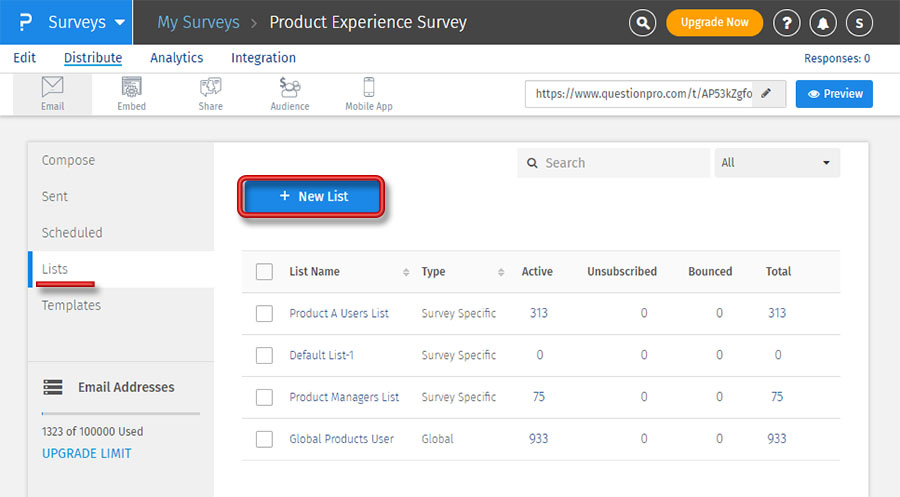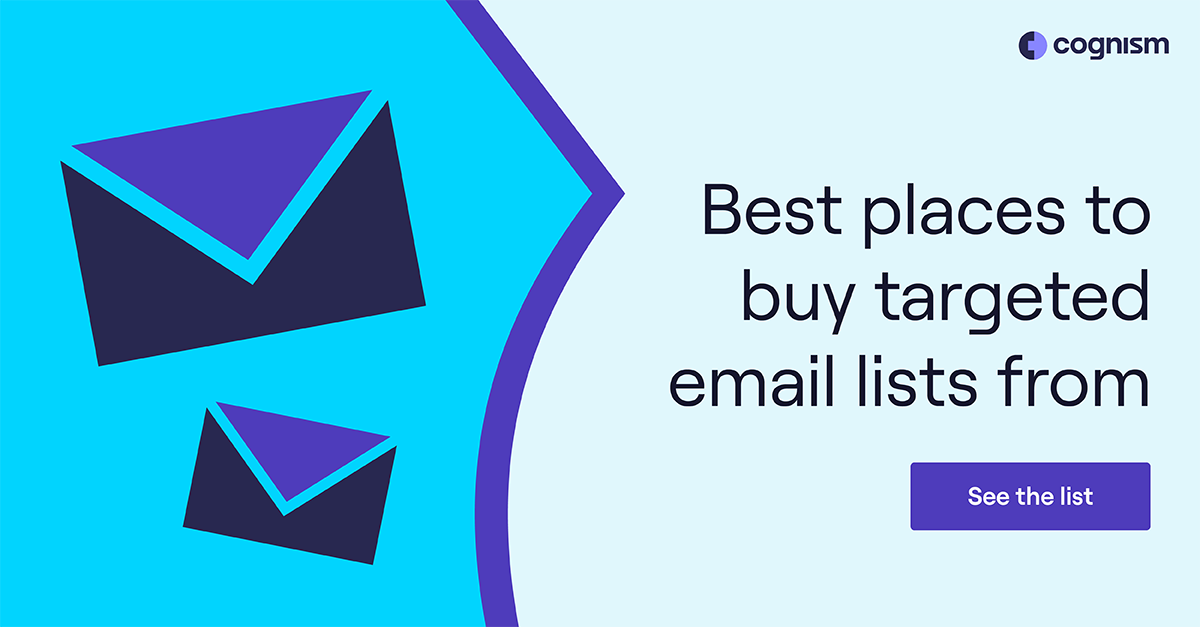Good Facts On Picking An Email List Site
Good Facts On Picking An Email List Site
Blog Article
What Are The Things I Need To Consider Prior To Purchasing An Email List For Hematologists?
To ensure your hematologist list is relevant, effective, accurate and compliant to the law, it is essential be attentive to a few key factors. These are the most crucial aspects to take into consideration: Quality of data and accuracy
Source of Information: Confirm that email list providers use reliable sources. For example, confirm that they use professional directories (such as an medical database), or verified opt-ins by hematologists. The reliability of contacts will determine the quality of the list.
Verification of data and updates Ask about the verification of data process that your provider uses. Verify email addresses to get rid of invalid or inactive addresses. It is essential to update the list accurate when healthcare professionals switch jobs or institutions.
Segmentation by Specialization: The list must be specific to the field of hematologists. If you are able, break the list further, such as by location, subspecialty or years of experience, or affiliation with hospitals. A well-segregated list helps you target your outreach more effectively.
2. Compliance with Legal Regulations
Data Privacy Laws – Ensure compliance with the data protection laws in place which include the General Data Protection Regulations (GDPR) for Europe, the California Consumer Privacy Acts (CCPA) for the U.S. and other applicable laws. It is a requirement that emails should be gathered only with the consent of the user.
CAN-SPAM Act: In the U.S.A. be sure the list complies with the CANSPAM Act, which governs commercial email communications. Non-compliance could lead to fines and your emails could be flagged for spam.
Opt-in Consent: The opt-in list should be comprised of hematologists who have explicitly consented to receiving emails from third parties. Sending uninvited emails to those who haven't given consent can cause poor engagement as well being a legal issue.
3. Provider Reputation
Check the reputation of the company. Check for testimonials, reviews and case studies to ensure the company is reliable. A well-established company with a track record of delivering high-quality and compliant data will be more likely.
Transparency - Select a data provider that is transparent regards to the source of the data and the way it was gathered. It is best to avoid providers that are unclear or ambiguous in their collection practices.
Customer Support: A reputable service provider will provide top customer support. Support is essential in the event that you require assistance in tackling technical issues, modifying your list or issues with compliance.
4. Return on investment (ROI) and cost
Pricing Models: Think about the pricing models available and consider whether they are pay-percontact, flat rate, or subscription. Be sure that the price is in line with the potential ROI. Balance the list quality and quantity to your budget.
Refund and Replacement Policy. The majority of reputable companies offer the option of a refund or replacement policy in the event that the email address you use is invalid or is not current. Make sure you understand the conditions of this policy prior to making the purchase.
Value for money: Compare the features on the list (such as segmentation and data accuracy guarantee provided by the service provider) against the cost. The list with the lowest price does not provide the most value in terms of value if it is based on low quality data.
5. Data Ownership & Usage
Single Use in contrast to. Understanding the terms of usage is crucial. Some service providers will only allow you to use their list for one campaign, while others might offer full ownership and unlimited usage rights.
Exclusive vs. Shared Lists: Determine the email list you are on is solely yours or shared with other people. Exclusive lists tend to have greater engagement as the recipients have less exposure to marketing emails.
6. Data Integration and Format
Compatibility with CRM and Email Tools: Make sure your email list can easily be integrated into CRM or email tools. For easy integration the list must be in a common format, such as CSV or Excel.
Usability: Check how easy it is to manage and filter the list. Lists that are hard to segment or manage can hinder the effectiveness of your campaign.
7. Ethical considerations
Relevance to Hematologists Be sure your outreach emails are pertinent to the field of hematology. Sending them content which doesn't correspond to their expertise could cause a lack of engagement and could negatively affect your image.
Beware of Spam practices. Do not overburden recipients with a lot of messages. Sending too many messages too frequently could lead to complaints about spam, which could damage the reputation of the emailer.
You can also read our conclusion.
Buying a hematologist email list could be an effective tool for targeted marketing, however, it is a matter of careful consideration. To ensure that you are getting a list of high quality and accuracy, focus on the accuracy of the data, the compliance with privacy regulations and the reputation and track record of the provider. Prioritizing segmentation and legal compliance can maximize your return on investment while ensuring a good reputation for your company. Follow the top hematologists email list for more guide.
Top 10 Things To Think About When Purchasing An Oil Or Gas Industry Email List
For a quality list that is targeted and in compliance to the law, take into account a variety of factors. Here are 10 important aspects to consider.
1. Relevance to the intended audience
Focus on Industry: The email list should be targeted specifically at the oil-and-gas sector. Professionals from the oil and gas industry including geologists, engineers, operations managers, decision-makers, and upstream, midstream and downstream operators must be included on a properly-segregated mailing lists.
Job Titles and Roles - Look for an inventory of the most important people in your company (executives/managers, engineers, etc.). within the organizations you want to target.
2. List source and vendor Reputation
Reputable List Providers: Buy only from companies that sell email lists who adhere to best practices. Avoid buying from sources with a questionable history. They may have poor data quality, or worse, legal issues.
Data Quality: Do some research or request testimonials to assess the quality of the data provider.
3. Data Accuracy, Freshness and Quality
Data Age. The list must contain the most up-to-date contact information. Staff changes are commonplace in oil and gas companies as are outdated contact details that could lead to high bounce rates.
Verification Process: Ensure that the vendor updates and regularly examines their contacts list to remove those who aren't responsive or inaccurate.
4. Compliance with Regulations
Legal Compliance: Ensure that the list of requirements is in line with local and international regulations like GDPR, CAN-SPAM, and many others, that govern the processing of personal information. Failure to comply could result in serious legal risks and penalties.
Opt in Process: Verify whether the email address on the list was collected with the consent of recipients, i.e. they've chosen to receive emails.
5. Segmentation and Customization
Custom Segmentation. Top list providers will offer options to segment based upon specific factors including location, role in the company, size of the business or subsector in oil & gas.
Custom Filters: Based on the goals of your campaign, ensure the list can be tailored to meet the criteria of geographical location and business size or any other specific requirements.
6. Deliverability Rate
High Deliverability Rates A well-designed list of email addresses will have high levels of deliverability (normally 95%). Low-quality list bounce rates can have a negative impact on your marketing email and the sender's reputation.
Get previous data or statistics on delivery to gauge the effectiveness of a list.
7. Volume Vs. Qualitative
Qualitative over Quantitative: The list should not be just vast, but also extremely precise and focused. A more compact and quality list is more effective than a generic, large one.
Engagement Metrics Prioritize engagement metrics over contacts. A receptive audience will be more likely respond.
8. Pricing and Cost Structure
Transparent Pricing. Learn the pricing structure of the list, no matter if you purchase it one-time or on a monthly basis. Beware of low-cost, list prices that are unusual. They might not provide any value or quality.
Return on investment (ROI). You can compare the price of the list with expected conversion rates to determine the amount of the ROI. In some cases, paying more for a specific list can make you more money at the end.
9. Privacy and security of the data
Check that the vendor adheres to strict practices for protecting data. The list provider should guarantee that all personal information is secured from access by unauthorized persons.
Privacy: Make sure that the provider will not share or resell your personal information, especially when your company requires privacy and discretion.
10. After-sales Customer Support
If you encounter any problems or require assistance with implementation, the vendor should provide continuous customer service.
List Replacement Warranty: A reputable provider will replace or refund the list in case of problems (e.g. incorrect data or poor delivery).
You can ensure that the list of email addresses you purchase is effective, compliant and aligned with business goals within the natural gas and oil business by considering these elements. Have a look at the expert oil and gas industry email list for site examples.